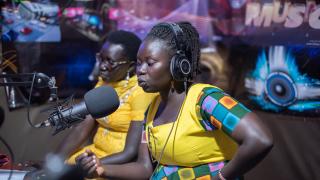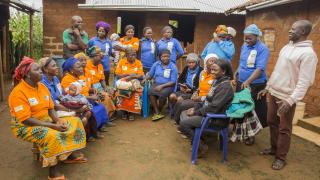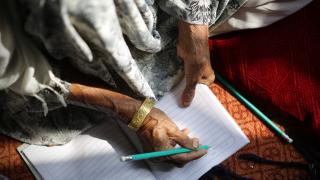Women are Using their Power to Change Social Norms in Post-Conflict Zones
According to the United Nations Commission on Human Rights (UNHCR) levels of violence against women are heightened in post-conflict zones. The increase in violence is attributed to the disruption in law and order, a “breakdown” in family and social structures, and the “normalisation” of gender-based violence in communities already shaped by systematic inequality.
Women for Women International invests in the power of women living in these communities. As we celebrate International Women's Day and Women's History Month, we reflect on the progress of women using their #PowerToChange in their lives and communities for generations to come.
In South Sudan, a young woman forced to marry at an early age lived with her husband and three children. One day, her husband left the house and disappeared for years without any communication or support, making his reappearance after the woman remarried.
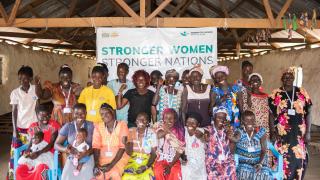
“Because of the work of the Change Agents Programme, the woman [knew] her rights to divorce,” says Yawa Jenty, an advocacy trainer in the community.
The woman advocated for a divorce at the courts in Juba. As a result, her first husband was given a divorce letter in a ruling which strayed from tradition.
An advocacy trainer in South Sudan, Yawa says this is one of many “positive changes” she has seen within her community as women are embracing their rights. Other changes have included reduced intimate partner violence and a change in attitudes towards women’s leadership, issues which contribute to the heightened violence against South Sudanese women amid the country’s ongoing conflict.
[Men] have accepted and are actually more willing to work together with women, because they realise that when they involve women, peace will be realised.
Our Change Agents programme enables women around the world to harness their power for justice, and to shift social norms in their communities which obstruct their rights. Operating through our Country Offices, they are trained to intervene in their communities and combat violence against women.
“Speaking to what I’ve seen of the communities in the last two decades, [violence against women] is a very troubling topic,” says Bukola Onyishi, Country Director of Women for Women International - Nigeria.
In Nigeria, violence against women is prevalent, yet widely unrecognised. 23.6 million women and girls were married before they turned eighteen, and one in four Nigerian women have experienced intimate partner violence.

Bukola says a young girl can be forced into a marriage with an older man like her father’s friend, finding herself in a “difficult environment from birth.”
“Sadly, the women don’t imagine that they have solutions, because in some cases some of them have cried to their parents and they tell them ‘go back, live with it. That is how you become a woman,’ or ‘that is how you manage life, there is no space for you back in your own home.”
Through our Change Agents programme in Nigeria, women are upending this “way of life” for themselves and other women as they receive support, become sensitized to violence, and learn how to combat violence in their communities. Graduates of the programme use their knowledge to disrupt harmful traditions from being passed onto their daughters.
Having information on where to get help, that you can get help in itself gives a lot of relief.
They are advocating for the rights of young girls to continue their education, for example, rather than the common outcome of dropping out of school to marry. Last year, our Change Agents in Nigeria even launched a primary school to encourage access to educational opportunities for girls.
“I see power in myself and I want to support other women whose voice is unheard,” says Khalida Lazgeen, Programme Officer in the Kurdistan Region of Iraq (KRI).
Khalida is also on a mission in her community to interrupt gender equality, where she says women face social and economic barriers due to the stigma around women business owners, and women in decision-making roles.
“Around the world, all are affected because of the economic crisis,” she says. “But especially in a place like Iraq, we are facing wars, conflicts, so our situation has no growth as crisis comes.”
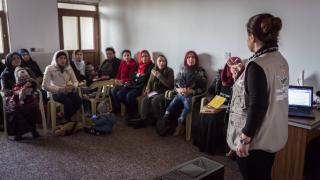
When Women for Women International initially began operating in the KRI, Khalida says an organisation for women’s rights was considered “strange.” As she told women in her community of the organisation, “where you can get introduced to your rights, where you can start up a business,” she says many told her they would not get involved, and that their husbands would not allow them.
However, after they became familiar with the organization, women began asking her to collect their names for intake into the program. The participants are initially hesitant to speak their own ideas, she says, but when they gain confidence, they make connections with each other as they receive knowledge that they share with their families.
“One day I was covering a session for a trainer,” Khalida says, “And a woman came up and said, ‘the homework that you gave me, my brother and my husband have a business, and the plans that you shared with us we implemented, and I gave them suggestions on how to develop their work.’”
These kinds of conversations are “interesting” to her as she observes the changes in participants’ families, and as men become interested in women’s opinions. Her work makes her feel proud.
Our work in Afghanistan, Iraq and South Sudan is enabled thanks to funds raised by players of People’s Postcode Lottery and awarded by the Postcode Justice Trust.
I want to use my power, through my works, through Women for Women International to support these women and raise their voice as much as I can.
read more
After years of silent suffering, the women of South Sudan are beginning to speak out about rape and sexual violence. Read about how Change Agents are breaking the silence on Violence Against Women over the radio.
Zainab Gbobaniyi is a lawyer and advocacy trainer with Women for Women International. Here she tells us about her life-long passion for women's rights and how she's working to give marginalised women a voice.
Community Advocacy
subtitle:
Our community-led approach is championed through our grassroots advocacy, the Change Agent programme. Change Agents drive forward their self-identified priorities to achieve sustainable and long-term change.

